 1 citations,
January 2022 in “Stem cell biology and regenerative medicine”
1 citations,
January 2022 in “Stem cell biology and regenerative medicine” New treatments are needed for hair loss, and cell therapies might reverse hair thinning.
 November 2024 in “Research Square (Research Square)”
November 2024 in “Research Square (Research Square)” Lipids may help treat hair loss by promoting hair growth through the HIF-1 pathway.
 October 2024 in “Current Issues in Molecular Biology”
October 2024 in “Current Issues in Molecular Biology” Platycladus orientalis leaf extract helps hair grow by activating certain proteins.
 June 2024 in “International journal of molecular sciences”
June 2024 in “International journal of molecular sciences” Adenosine complex helps increase hair thickness and density in hair loss.
FGF5 spliceosomes inhibit rabbit hair growth by affecting gene expression.

N793 may improve hair density in people with mild hair thinning.
December 2023 in “Animals” The study mapped yak skin cells to understand hair growth better.
 August 2023 in “Stem Cell Research & Therapy”
August 2023 in “Stem Cell Research & Therapy” A substance called Cell-free fat extract can effectively treat common hair loss by increasing hair growth and density.
 July 2023 in “Journal of Microbiology and Biotechnology”
July 2023 in “Journal of Microbiology and Biotechnology” Terminalia bellirica extract may help promote hair growth and prevent hair loss caused by testosterone.
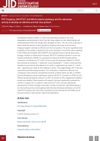 November 2022 in “Journal of Investigative Dermatology”
November 2022 in “Journal of Investigative Dermatology” The lotion with specific plant extracts effectively increased hair growth and improved hair cycle in subjects after 3 months.
 November 2022 in “Journal of Investigative Dermatology”
November 2022 in “Journal of Investigative Dermatology” The extract of Silybum marianum, Manganese PCA, and Lespedeza capitata can boost hair growth and extend the growth phase when combined in a serum.
 November 2022 in “Bioengineering”
November 2022 in “Bioengineering” The method can test hair growth products using a lab-made hair-like structure that responds to known treatments.
 April 2018 in “Journal of Investigative Dermatology”
April 2018 in “Journal of Investigative Dermatology” Researchers found a substance in chicken egg yolk that helps hair grow.
 April 2017 in “Plastic and reconstructive surgery. Global open”
April 2017 in “Plastic and reconstructive surgery. Global open” Baby and adult skin cells are different, with baby cells having more active pathways that could help grow new hair follicles.

Glycyrrhizic acid and licorice extract can significantly reduce unwanted hair growth.
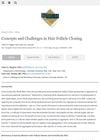 January 2014 in “Hair transplant forum international”
January 2014 in “Hair transplant forum international” Hair follicle cloning is possible but faces many challenges before it can replace traditional hair transplants.
Natural products may help treat hair loss by promoting hair growth with fewer side effects.
 1113 citations,
August 1999 in “The New England Journal of Medicine”
1113 citations,
August 1999 in “The New England Journal of Medicine” Hair follicle biology advancements may lead to better hair growth disorder treatments.
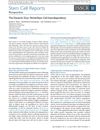 31 citations,
May 2015 in “Stem Cell Reports”
31 citations,
May 2015 in “Stem Cell Reports” Stem cells and their surrounding environment in hair follicles work closely together, affecting hair growth and having implications for cancer and tissue regeneration.
 4 citations,
November 2021 in “Frontiers in Cell and Developmental Biology”
4 citations,
November 2021 in “Frontiers in Cell and Developmental Biology” Aging causes hair loss and graying due to stem cell decline and changes in cell behavior and communication.
 4 citations,
May 2012 in “Tissue Engineering and Regenerative Medicine”
4 citations,
May 2012 in “Tissue Engineering and Regenerative Medicine” Scientists created three types of structures to help regrow hair follicles, and all showed promising results for hair regeneration.
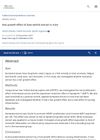 November 2024 in “Traditional & Kampo Medicine”
November 2024 in “Traditional & Kampo Medicine” Kumazasa extract promotes hair growth in mice like minoxidil but without side effects.
 2 citations,
August 2024 in “International Journal of Dermatology”
2 citations,
August 2024 in “International Journal of Dermatology” Adipose stem cell-derived exosomes are safe and effective for hair regrowth in AGA patients.
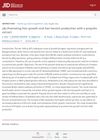 July 2024 in “Journal of Investigative Dermatology”
July 2024 in “Journal of Investigative Dermatology” Propolis extract can promote hair growth and increase keratin production.
 February 2024 in “Journal of medicinal food”
February 2024 in “Journal of medicinal food” The research found a way to develop hair growth materials by targeting a specific signaling pathway.
29 citations,
March 2014 in “PloS one” Astragaloside IV may help prevent hair loss by blocking a specific pathway that leads to cell death.
4 citations,
June 2020 in “Cosmetics” Broussonetia papyrifera extract helps hair growth by regulating specific proteins.
 1 citations,
March 2022 in “Daehanhanuihakoeji”
1 citations,
March 2022 in “Daehanhanuihakoeji” Artemisia sieversiana extract may help prevent hair loss and promote hair growth.

Hair RiseTM microemulsion effectively promotes hair growth and treats hair loss better than standard treatments.
 51 citations,
July 2013 in “Bioorganic & Medicinal Chemistry Letters”
51 citations,
July 2013 in “Bioorganic & Medicinal Chemistry Letters” Compounds from Polygonum multiflorum root, especially a new one, can boost hair growth more effectively than common treatments.

























